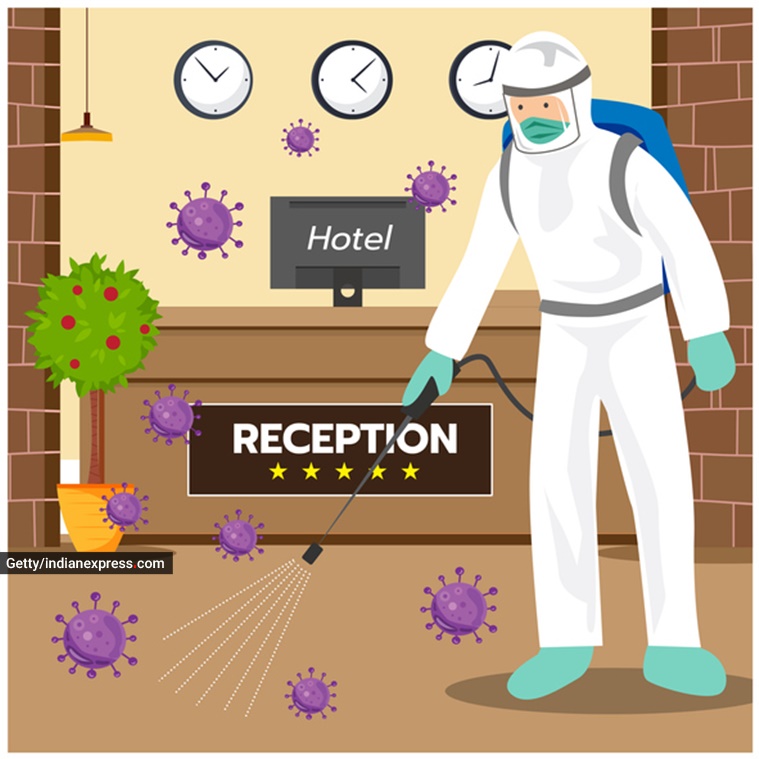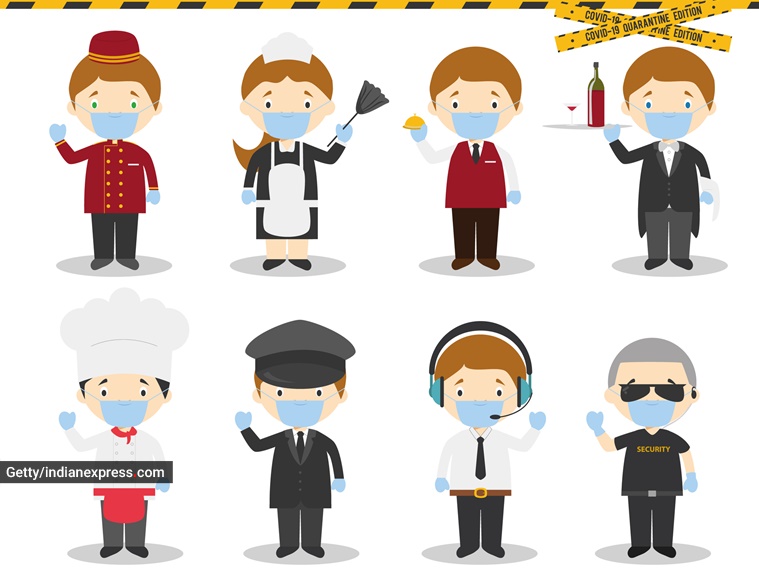 As the shift takes place, gyms and swimming pools being shut indefinitely are only some of the major changes. (Photo: Getty)
As the shift takes place, gyms and swimming pools being shut indefinitely are only some of the major changes. (Photo: Getty)
You check into a hotel, head straight to its coffee shop and as you wait for the waiter to bring your order of hot cappuccino, you stroll past perfectly lined desserts, clicking pictures and enjoying the delectable aroma.
Will it still be the same for us?
Hotels are in metamorphosis as they prepare for a post-pandemic world. No bars, buffet, spas and swimming pools are only some of the changes as the hospitality industry re-defines itself. “The past two months with zero revenue has been a rollercoaster of a ride but it gave us the opportunity to reflect and improvise safety for guests,” says Saurav Dutta, General Manager, Park Inn by Radisson, IP Extension.
Ever since the protocols for social distancing and lockdown norms were put in place, the hospitality industry particularly felt the brunt. As hotels gear up to open up in accordance with the norms put forth by WHO, the entire operation is going to change. “The whole concept of servicing our guests is going to change. From the pick up at the airport to the check-in, entire stay and until check-out, we plan to make everything as contact-less as possible,” Dutta tells indianexpress.com.
READ| Unlock 1: Malls, hotels, places of worship can reopen on June 8; bars, gyms still prohibited
Bringing in contact-less operation procedures
 A detailed self-declaration form needs to be signed once the guest checks-in the hotel. (Photo: Getty)
A detailed self-declaration form needs to be signed once the guest checks-in the hotel. (Photo: Getty)
Redefining standard operating procedures for post-lockdown service, “we brainstormed on how we could reduce the number of touchpoints for guests during their entire stay with us,” said Aradhana Lal, Vice-President-Brand, Communications & Sustainability Initiatives, Lemon Tree Hotels.
The focus is on making guests feel safe. “When the guest sits in the car, there will be a sanitiser, tissue, and gloves available. We are doing away with newspapers and will only subscribe to e-versions,” mentions Lal.
In a press statement, Puneet Chhatwal, MD & CEO, Indian Hotels Company (IHCL), said: “Menus will largely be digital or single-use, with greater emphasis on wellness-oriented food sections for healthier meals and a greater level of immunity.”
For Park Inn by Radisson, certain moves in this direction had begun pre-pandemic. In 2019, the hotel had installed Alexa in its deluxe and junior suites to request for services and now plans to expand it to its elevators. “The guest does not even have to call up the front desk. They can simply make amenity requests using voice commands. We plan on installing the same system in our elevators so the guest does not have to touch the buttons,” says Dutta.
Prince Jagrit (25), an avid traveller, describes his experience at the hotel during the 21-day lockdown that was later extended. “I wasn’t allowed inside the premises until my temperature was checked. While the ambience was the same, the items being served were limited.”
There will be a change in how the front desk will interact with guests post-COVID. With the aim to make the experience as sanitised and safe as possible, Lal mentions, “We request guests to use their own pens. We have queue managers in place with markings on the floor to maintain social distancing. We have just launched an initiative called Rest Assured in partnership with Diversey. All areas of the hotel are being sanitised for greater guest safety.”
Additionally, at the time of check-in, guests now have to sign a detailed self-declaration form sharing their travel history for 14 days prior to arrival.
For Radisson Blu, Guwahati which offers paid quarantine facilities with two other hotels, namely Vivanta Guwahati and Novotel, the hotel has been divided into two separate sections, for flight crew and those availing quarantine services. Vikas Ray, the general manager, says that “tables have been placed outside all guest room doors. Once their meal is finished, they have to place it in a sealed garbage bag which is disposed of as per guidelines issued by the municipal corporation and health department, the government of Assam.”
Guests, too, have appreciated the changes. Says Navanita Bhattacharya (name changed), “The staff was sincere and they made it a point at every step to maintain sanitisation and safety for themselves and us.”
Costs reviewed, rationalised and reduced
 The food and beverage area of the industry is going through a major change manifold. (Photo: Getty)
The food and beverage area of the industry is going through a major change manifold. (Photo: Getty)
As mentioned in an article by The Economic Times, Hyatt hotels had to lay off at least 1300 employees globally because of tourism and travel being hit and a slowdown in the economy. With salary cuts and layoffs during the two months of lockdown, hotels have struggled for revenue while trying to maintain their fixed cost of running the hotel. Vikas mentions, “In order to meet our fixed costs, there has to be a minimum 30 per cent occupancy.”
An article by TOI reported that 70 per cent of hotels and restaurants could close in 45 days, in the absence of government relief, in a warning sounded by FHRAI. With restructuring in full force, Lal says, “As a company, it is our responsibility to manage costs and do the best to find revenues.” However, she points out, “You cannot stop the cable TV in the guest’s room but you can opt for a cheaper bouquet of channels.” Other changes include discontinuing the buffet service and moving to in-room dining to reduce touchpoints while cutting down on the food cost.
With restaurants services functioning at 50 per cent occupancy, many hotels have also started home delivery services, such as Park Inn by Radisson IP Extension, within 10 km of their radius.
With in-room dining, discontinuation of platter-to-plate service and four-seater tables for two people, will these changes affect footfall? To this, Dutta remarks, “Covid-19 will be a new normal for everybody and the occupancy will gradually increase starting from 5 per cent to 50 per cent by the end of this year.”
As Indianexpress.com had reported, a 4-star hotel in Shimla decided to offer discounts through gift vouchers which will be valid for a year, in a bid to keep revenue streams going and keep its staff engaged.
However, Jagrit who travels frequently strikes a positive chord when he says, “I will continue to make trips because I do not want to sit around wondering when things will end. I have to be more careful, of course.”